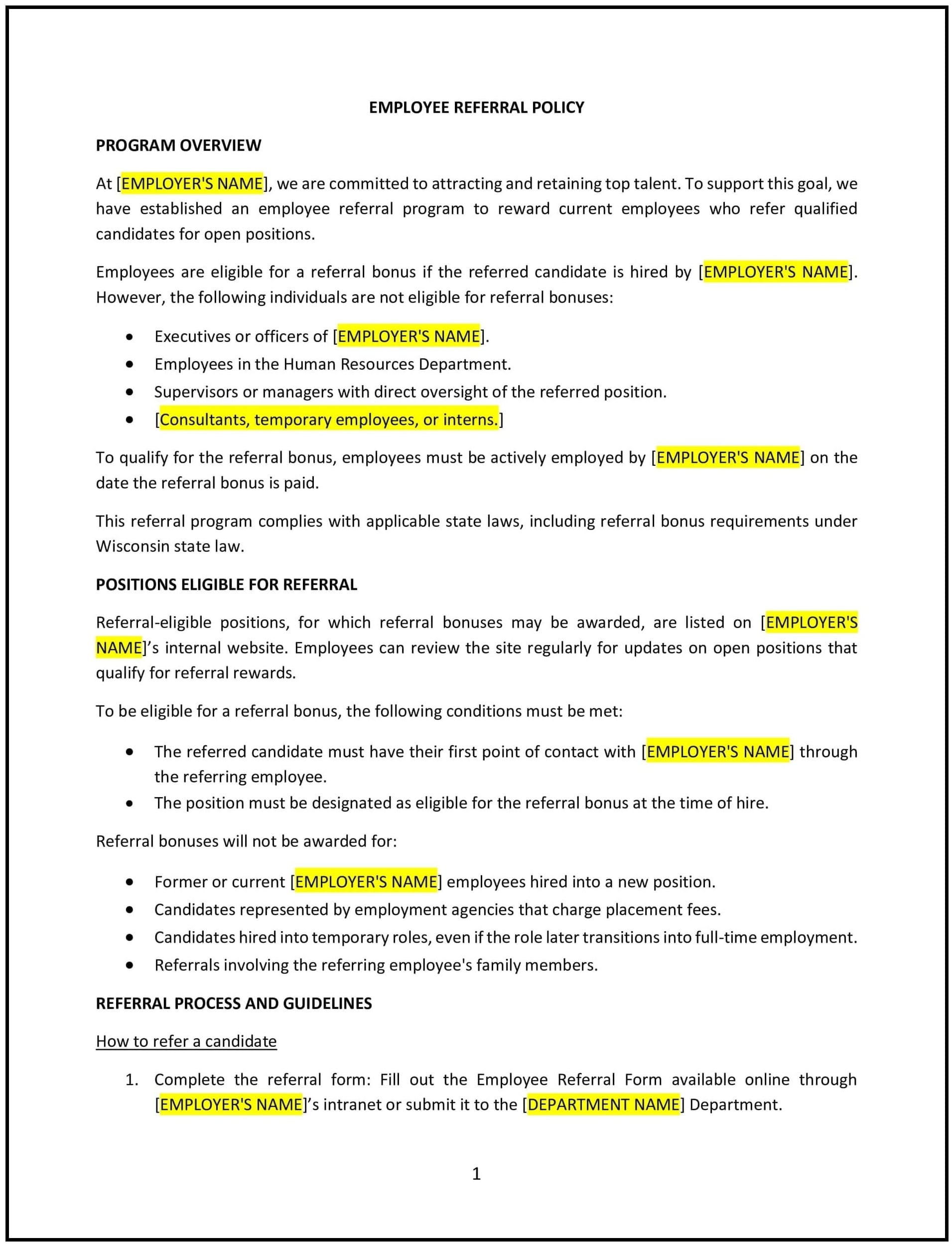Employee referral policy (Wisconsin): Free template
Got contracts to review? While you're here for policies, let Cobrief make contract review effortless—start your free review now.

Customize this template for free
Employee referral policy (Wisconsin)
An employee referral policy helps Wisconsin businesses encourage their employees to recommend qualified candidates for open positions within the company. This policy outlines the process for submitting referrals, any incentives or rewards for successful hires, and the conditions under which employee referrals are eligible for consideration.
By implementing this policy, businesses can tap into their existing workforce’s network to find high-quality candidates, improve employee engagement, and reduce recruitment costs.
How to use this employee referral policy (Wisconsin)
- Define eligibility: Specify who is eligible to participate in the referral program, such as full-time employees or part-time employees, and exclude certain individuals such as those in HR or senior management if necessary.
- Set guidelines for referrals: Outline how employees can submit referrals, including the process for submitting a candidate's resume or application, the required information (e.g., candidate’s qualifications, contact information), and how referrals will be tracked.
- Specify referral incentives: Define the rewards or incentives employees will receive for successful referrals, such as a cash bonus, gift cards, or other benefits. Include any conditions for receiving the reward, such as the new hire completing a certain length of employment (e.g., 3 months or 6 months).
- Address eligibility for specific positions: Clarify if there are any limitations regarding which positions are eligible for the referral program. For example, the policy may exclude executive-level positions or positions that require specialized qualifications.
- Set expectations for the hiring process: Explain how referrals will be evaluated and processed, ensuring employees understand that the company will evaluate all referrals based on qualifications and experience, without bias.
- Maintain fairness: Ensure that referrals are treated equally, regardless of the employee’s position within the company. The policy should also specify that the company will not discriminate based on referral sources or other factors.
- Protect confidentiality: Reassure employees that the referral process will respect the privacy of both the referring employee and the candidate. Ensure that personal information and hiring decisions are kept confidential.
- Monitor and review: Set up a system to track and review the effectiveness of the referral program, ensuring that it meets the company’s recruitment goals and is beneficial to both employees and the business.
Benefits of using this employee referral policy (Wisconsin)
This policy offers several benefits for Wisconsin businesses:
- Reduces recruitment costs: By leveraging the networks of current employees, businesses can reduce the need for external recruiters or paid job advertisements, saving on recruitment expenses.
- Increases hire quality: Employee referrals tend to result in higher-quality hires, as employees are more likely to recommend candidates they believe will fit well with the company’s culture and job requirements.
- Strengthens company culture: Encouraging employees to refer candidates who align with the company’s values and culture can help strengthen and promote a positive work environment.
- Boosts employee engagement: Referral programs empower employees to participate in the hiring process and contribute to the company’s success, leading to higher job satisfaction and engagement.
- Shortens the hiring process: Referred candidates are often faster to hire because they come with a recommendation from someone already within the company, reducing the time spent screening and interviewing.
Tips for using this employee referral policy (Wisconsin)
- Communicate the program clearly: Ensure that all employees are aware of the referral program, the guidelines, and the rewards. Consider providing a dedicated page on the company’s intranet or regular reminders in company-wide communications.
- Provide clear incentives: Make sure that the incentives or rewards for successful referrals are attractive enough to motivate employees to participate. Publicly acknowledge employees who make successful referrals to further encourage participation.
- Make the process easy: Simplify the referral process as much as possible to make it easy for employees to refer candidates. Provide them with clear instructions and a straightforward submission form.
- Regularly review and improve: Periodically review the program’s effectiveness, assess employee feedback, and make adjustments to the policy or incentives as needed to keep it relevant and effective.
- Track and follow up: Keep track of all referrals and provide employees with updates on the status of their referrals throughout the hiring process. This ensures transparency and encourages continued participation.
- Ensure inclusivity: Ensure that the policy applies to all employees equally and that there is no bias in the referral process, including for positions that may be referred by different departments or management levels.